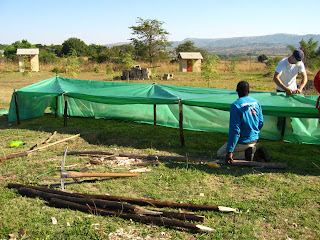Getting there....!
Jun 18, 2008
Interim Follow-up
We are approaching our first formal round-table discussion amongst our partners this Saturday, June 23rd, at the Emafini Business Center. It will be attended by all of our moringa partners and interested parties to discuss future plants, expectations, and formalize intentions.
The past 3 weeks has seen us hold positive meetings with the Ministry of Agriculture and Co-Operatives, TechnoServe, and PSI (Population Services International) Swaziland.
At the meeting with MOAC, negotiations yielded the number of plots being brought down from 5 to 3 but with an extra plot at the Malkerns Research Station to total 4. However, the 250 plants that were proposed would be distributed among the three plots with an extra 50 planted at Malkerns Research. This was the accepted agreement and they are now running it through their superiors. We'll have a response in about two weeks.
TechnoServe is an internationally established consulting organization that provides numerous services for small and growing enterprises in developing countries. We believe that their experience with the handicraft/trade market would help us greatly as we begin preliminary research on our own handicraft/ income generation venture with a group of skilled artisans. They have been established with 3 handicraft groups for approximately 5 years now, and have essentially reorganized the internal structure of the production scheme, connecting textile manufacturers with producers, finding trade show opportunities, and opening new markets. There were many constructive lessons learnt from that meeting, the main one being: learn about our product. We have to gauge the skill involved in making the bags, the uniqueness of the bag, and whether or not there are other similar competitors our there. The question of what markets are out there for these bags is a very important one. Most importantly, we have to see if there is a demand for such a product. That will determine how far we can go.
PSI is a well respected social marketing organization that has taken an aggressive stance on HIV prevention in Swaziland through a number of successful programs. We approached them to learn more about their micronutrient projects in South America; we wanted to see if they would be interested in doing similar work with us in Swaziland. The response was enthusiastic as they have a Mother and Child Wellness products program. It currently includes promotions for de-worming tablets and water purification tablets. Promotion of moringa would be slotted into that program. However, this is all in the future and we still have many steps before we reach that stage.
The last week and a half has been spent securing our first large shipment of moringa powder for taste trials and nutritional analysis by the Nutrition Council. In addition, we have secured a pathway for seed importation. All these steps are crucial as we get closer to starting groundwork with the Moringa plants. To protect the seedlings we had already planted from the cold winter, we constructed a simple greenhouse north of Piggs Peak, located in the northwest Midveldt region. If the greenhouse works as planned, we can nurture the moringa seeds during winter months for planting in summer time as strong seedlings.
While in Northern Swaziland, we were fortunate to meet with a well-known Moringa advocate based in South Africa. He was encouraged by our progress thus far, and definitely agreed that Moringa implementation in Swaziland is not only feasible, but beneficial for all parties involved, especially those who need it most, the rural communities. His greatest emphasis was on the current presence of moringa powder on the streets of South Africa. Apparently, street vendors are already making a substantial profit, selling two tbsps of Moringa powder for 5 rand. In his own words, they are "selling like hotcakes". This reinforces what we have known, that Moringa demand is growing tremendously.


